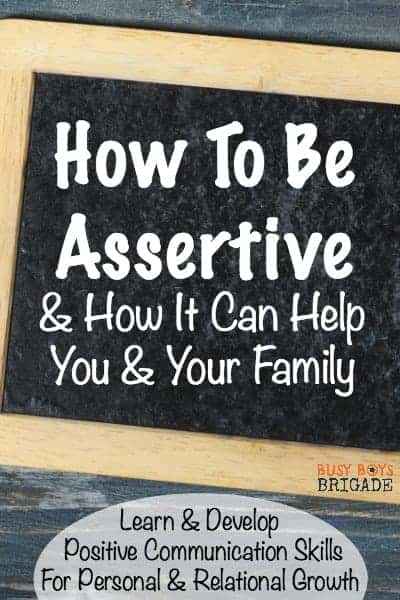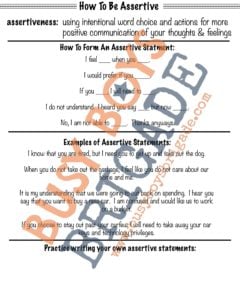How To Be Assertive & How It Can Help You & Your Family
This post may contain affiliate links. Please read my disclosure statement. Thanks for visiting!

Learn how to be assertive and how it can help your family. Assertiveness is an important life skill that can help you with relationships and positive growth. Here you will find powerful reasons to be assertive and tips on how it will help you rock a variety of areas in your life.
This post is part 1 of a series dedicated to assertiveness training. Discover the definition of assertiveness and reasons why it will help you develop positive relationships. Part 2 will provide more details on how adults can learn and apply assertive skills in their daily lives. Part 3 will address training our children to be assertive and how it can be beneficial in a variety of areas, including friendships, overcoming bullies, and family life. Part 4 will look at how you can be assertive in our modern world.
What Does It Mean To Be Assertive?
Assertiveness has been defined on wikipedia as:
the quality of being self-assured and confident without being aggressive. In the field of psychology and psychotherapy, it is a learnable skill and mode of communication.
Pyschology Today shares a similar definition, as well links to some informative posts related to assertiveness. This definition incorporates behavioral, relational, and interpersonal aspects of this positive skill.
Sometimes, it is easier to understand a concept by knowing what it is not. Assertiveness is NOT aggressive in word or actions. Assertiveness is NOT being passive and allowing another person to walk all over. Assertiveness is NOT doing things on the sly to avoid an issue.
Based on personal experience and work as a mental health therapist, I recognize these aspects to being assertive:
- Defining the issue
- Researching the issue (if necessary)
- Making a personal decision about the issue based on rational thought process
- Determining how to stick to your decision while respecting the decisions of others
- Standing firm by your decision out of respect for self
- Positive word choice in communication with self and others
- Awareness of body language and how it communicates your internal beliefs
- Identification of emotions and how they positively or negatively impact the issue
- Assessing when it is time to remove self from situation that appears insolvable
These features of asssertiveness-and more!-will be looked at here and even closer in the next three parts of this series.
Why Is It Important To Be Assertive?
Assertiveness helps both you and others in your life. At a personal level, you develop an increase in self-confidence and self-esteem. Your self-knowledge also improves which allows for better decision making and overall well-being.
At an interpersonal level, assertiveness enables improved communication. When used effectively, there should be no second-guessing or wondering what each other is truly thinking. Healthier relationships develop through mutual respect.
Healthy boundaries are also formed when assertiveness is implemented. You know where you stand and what you will allow in your life. Your decision is made with care and thoughtfulness. Time is taken to cultivate a respectful response while including your own thoughts and feelings.
Empathy is another significant development from the appropriate use of assertiveness. When you practice being assertive, you place yourself in another's shoes. You are trying to see the issue from their perspective. In doing so, you are more likely to identify with and acknowledge their thoughts and emotions.
How To Be Assertive 101
These elements of assertiveness can come together with ease after some consideration and practice. The approach you have to assertiveness training will more than likely depend upon your personality type. This article on How To Be Assertive found on wikiHow is extremely helpful.
Other factors to consider as you work towards being more assertive in all aspects of your life include:
- past traumas (if you have a history of any type of abuse or experience with traumatic situations, I advise to consider seeking more personal one-on-one counseling if you have not yet done so)
- current mental health status (if you have larger issues going on, consult a medical professional)
- emotional state surrounding issue (if you are fired up or paralyzed, it may not be wise to act at this time. Seek out others that you trust to give you advice and guidance as far as when to begin using assertiveness skills.)
My approach to mental health is holistic. I believe that our thoughts and feelings are intertwined with behaviors. To truly make a positive change in any area of your life, I contend that you need to include all of these aspects of self:
- Identify Thoughts
- Accept Emotions
- Recognize Behaviors
These three parts to your well-being will be addressed in more depth in the next two parts of this series.
Tips For Being Assertive & Getting Your Message Heard
- Personalize your assertive statement. Use the word "I" (see free How To Be Assertive download)
- Be selective in your words-choose with care!
- Be sensitive to the other person.
- Use a calm yet firm voice.
- Take a deep breath and blow out for count of 3 prior to giving your assertive statement.
- Be mindful of your body language. Prior to talking, clench and release your fists. Do not stand with arms crossed in front of your body.
- Look the other person in the eye.
- If time allows, prepare. Write down and practice speaking out loud in an assertive fashion.
- Practice being assertive. Speak to yourself in front of a mirror. Observe your body language and adjust accordingly.
- Develop your emotional language. Look up synonyms in the thesaurus to help you give a variety or better description of what you are thinking and feeling.
To help you and your family work on becoming more assertive (yes, it will take work but it will be worth it!), I created this FREE How To Be Assertive worksheet. You will find more information about assertiveness, examples of assertive statements, and area to work through your own assertive approach. Click on image below for your FREE INSTANT DOWNLOAD!
I look forward to sharing ways you can develop your assertiveness skills and teach your kids how to use. Families with assertive interactions are able to grow stronger and closer.
Do you struggle with being assertive? Are you more likely to be aggressive or passive?
How would you like to use this assertiveness training to improve your relationships?

